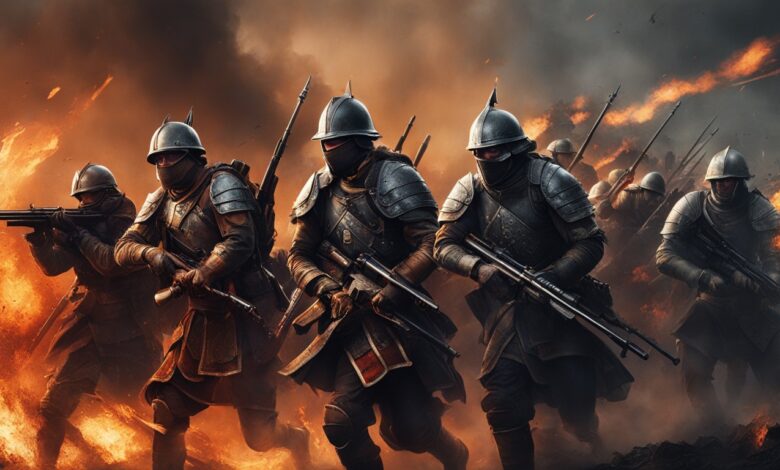Timeless Art of War Quotes for Strategy & Wisdom

When we face big challenges, they can seem impossible to overcome. You might feel lost and not know what to do. But there’s help out there in ancient teachings. The Art of War by Sun Tzu is one source. Originally about war, it has many quotes on strategy, wisdom, and leading.
No matter if you work in business, are in school, or just need a boost, these art of war quotes are gold. They offer great lessons for life’s different areas. Sun Tzu’s wisdom on strategy, leadership, and inspiring others is timeless.
Quotes on the Philosophy of War and Warriors
Sun Tzu’s insights in The Art of War can guide us in life today. They shed light on warfare’s significance, the horrors of conflict, skillful soldiers, and knowing both foe and self. These words spark deep thinking about war’s relation to our everyday life.
“The supreme art of war is to subdue the enemy without fighting.”
Sun Tzu’s famous quote focuses on the clever side of warfare. It points out that the best win is achieved by avoiding direct battle. Winning by outsmarting instead of using force is the real triumph.
- Philosophy of War: Sun Tzu’s teachings show a profound grasp of war’s philosophy. They urge us to think about why wars start, their outcomes, and the moral issues they raise.
- Warriors: Sun Tzu highlights what makes a warrior great: discipline, courage, adaptability, and smart planning. His words encourage people to adopt these qualities in their own lives.
- Strategic Questions: Sun Tzu’s wisdom makes us consider how to use advantages, spot weaknesses, and predict enemy moves. These questions are key in both war and personal strategies.
Quotes on War and Leadership
Sun Tzu’s wisdom on war and leadership shows how crucial leaders are to success. He highlights the importance of planning, defense, discipline, making wise choices, being flexible, and knowing your enemy well. These insights are useful not just in war but also in other areas, providing great advice for different leaders.
“The general who wins the battle makes many calculations in his temple before the battle is fought. The general who loses makes but few calculations beforehand.”
“The supreme art of war is to subdue the enemy without fighting.”
These quotes stress the value of careful planning and smart thinking. Leaders should carefully prepare and strategize to be successful. War is more than just fighting; it’s about finding new ways to achieve goals.
Sun Tzu’s ideas on leading well also focus on key leadership qualities. He talks about knowing the enemy’s tactics and using this knowledge to make strong, well-thought-out strategies. Leaders can use these strategies to beat their enemies.
In addition, these war strategies apply to more than just fighting. They’re important for doing well in business, politics, and other areas. Sun Tzu’s teachings encourage making smart choices, being flexible, and handling tough problems well.
Balancing Authority and Adaptability
Leaders need both authority and the ability to adapt. “The general who advances without coveting fame and retreats without fearing disgrace, whose only thought is to protect their country and do good service for their sovereign, is the jewel of their kingdom,” wrote Sun Tzu. This shows the ideal leader as someone who prioritizes serving others and their mission above all.
Being a good leader also means being able to change when needed. Sun Tzu says leaders should always be ready to adjust their plans. “In battle, use the standard to control the enemy. In retreat, use the enemy to control your own troops.” This highlights the importance of making decisions quickly, based on what’s happening, to gain an edge.
Truly great leaders focus on their team’s success, not just their own. Sun Tzu’s teachings can guide leaders through the challenges of war. They help leaders support and protect those they lead, ensuring long-term success.
Quotes on War and Strategy
Sun Tzu’s quotes offer deep thoughts on war and strategy. They give insights into planning, taking chances, preparing, being tricky, and moving. These wise words help guide people in handling conflicts, making wise choices, and reaching success with thought and smarts.
They’re useful in all areas of life, from business to politics to friendships. Sun Tzu’s words show the key role of thinking strategically in any situation.
“Strategy without tactics is the slowest route to victory. Tactics without strategy is the noise before defeat.”
In war, or in any big challenge, a good plan is crucial. Sun Tzu’s quote points out how strategy and tactics must work together. Success depends on blending these vital aspects in execution.
To win in battles, or life in general, you must adapt and choose wisely using smart strategy. Sun Tzu’s quotes light the way, giving clear advice and purpose in tough times.
Seizing Opportunities
Sun Tzu also highlights the key role of taking chances that come up in chaos and surprise. These hidden chances in tough times hold promise for growth and gain.
“Opportunities multiply as they are seized.”
Truly successful people see the chances in change and disorder. Sun Tzu’s teachings push us to stay alert to these chances, for success both on the battlefield and in daily life.
Intelligence and Decision-Making
Winning in war means knowing a lot, knowing yourself well, and understanding the enemy cleverly. Sun Tzu’s tips stress the importance of having the right info for smart choices.
“The supreme art of war is to subdue the enemy without fighting.”
According to Sun Tzu, real victory means not just fighting but being smarter and shrewd than your rival. It takes deep insight, good info, and strategic mastery. This quote focuses on winning through smarter moves, showing the strength of using strategy and wisdom.
Sun Tzu’s lessons from The Art of War are not just for warfare. By valuing strategy, seizing chances, and choosing wisely, we can face any challenge and aim for success.
The Influence of The Art of War
The Art of War, written over two millennia ago by Sun Tzu, has greatly influenced thinkers. It is an invaluable source of strategic wisdom. This wisdom can be used in many areas of life, like business, politics, and personal relationships. The book’s teachings have shaped how we understand strategy and success.
“The supreme art of war is to subdue the enemy without fighting.”
Sun Tzu’s work is a guide for dealing with disputes, whether in war or daily life. His advice is still helpful in many situations today. This makes The Art of War a must-read for leaders looking for insight.
The book puts a lot of focus on military philosophy. Sun Tzu thought real skill in war came from understanding the principles of strategy. Leaders who learn these ideas can understand their enemies better and make better plans.
The Art of War also talks about being able to change your plans when needed. Sun Tzu knew that successful leaders have to be flexible. This is important for dealing with problems or changes easily.
The Relevance Today
The Art of War is still important, even though it’s ancient. Its advice is helpful for those looking for leadership principles. The book helps with strategy and making good choices, not just in war.
- The Art of War shows the importance of knowing yourself and your enemies. If you know your strengths and theirs, you can make smarter choices.
- It emphasizes getting ready and being disciplined. Good planning and staying organized are key to success, in both war and life.
- It also says to jump at good chances when they come up. Taking quick and smart actions can lead to big wins in life.
Sun Tzu’s deep thoughts and strategies have stood the test of time, making The Art of War a classic. Its lessons in military and leadership are still used today. The book continues to teach strategy and success, showing how valuable its insights are. It offers important lessons for strategy, beyond just war.
Know Your Enemy and Yourself
Sun Tzu said, “Know yourself and know your enemy, and you shall never be defeated.” This hints at the vital role of self-awareness and understanding others. By gaining knowledge, we make smarter choices and predict what others might do.
For war, it highlights the need to gather intel on the enemy. Knowing their strengths and weaknesses helps strategists plan to beat them.
Extrapolating to life, it’s crucial for personal growth and success. Knowing our own strengths and weaknesses lets us work towards our dreams. We learn how to use our strengths and improve on our weaknesses.
It’s also key in dealing with people at work or in life. Understanding others helps us connect and work well together. We can think ahead by guessing what they might do and forge good relationships.
“Know yourself and know your enemy, and you shall never be defeated.”
It all points to how knowing things can really help us. It pushes us to learn about ourselves and others. Getting this knowledge helps us make wise choices and reach our goals.
This teaching also hints that we should always keep learning. Staying curious and open to new knowledge is key. It helps us avoid pitfalls and grab chances that come our way.
Seeking Knowledge and Understanding
Success lies in understanding both ourselves and the world around us. Sun Tzu’s words teach us the power of knowing who we are and learning constantly. With this insight, we can take on life’s challenges with courage and reach our dreams.
Seize the Strategic Moment
Sun Tzu’s quote, “In the midst of chaos, there is also opportunity,” is a powerful message. It reminds us that challenges often bring chances for growth and progress. It stresses the need for a positive outlook and the courage to adapt.
Being open to new paths is key as opportunities can appear unexpectedly. Staying flexible and quick to act can lead to great achievements.
This wisdom isn’t just for war. It’s useful in business, personal life, and more. Knowing how to spot and use favorable situations can give you an upper hand.
“In the midst of chaos, there is also opportunity.”
Timing is crucial in seizing chances. It needs preparation, a sharp instinct, and the courage to act. This approach not only leads to personal growth but also speeds up goal achievement.
Following Sun Tzu’s teachings helps in turning life’s chaos into stepping stones for progress. Understanding and using these moments is the path to success in anything you do.
Embracing Change and Adaptability
Sun Tzu’s quote underscores the value of adapting to seize opportunities. In a world that’s always changing, being adaptable allows you to make the most of situations.
Being able to change your approach can lead to breakthroughs and wins. Staying open and flexible prepares you to grab new chances as they come.
The Power of Positive Mindset
A positive mindset is vital for making the most of opportunities. It helps you see possibility in difficulties and face problems with hope.
Believing in growth and success, even in chaos, keeps you motivated. A positive outlook unleashes your true potential and illuminates hidden chances.
Image:
Preparation and Discipline
Sun Tzu highlighted how vital preparation and discipline in The Art of War are. He said they’re key not just in battle but in all areas. This includes making strategies, decisions, and reaching goals.
Getting ready means planning well, knowing the ground, and looking at what’s at hand. When we gather information and check the situation, we can choose wisely. We also learn how to spot challenges and chances ahead. Sun Tzu tells us how setting a strong base is crucial.
“Victorious warriors win first and then go to war, while defeated warriors go to war first and then seek to win.”
Preparation comes before action, as stated here. It points out how important it is to plan and think strategically first. By preparing fully, our success rate goes up.
Being disciplined is also key, as Sun Tzu points out. It’s about sticking to the plan, obeying orders, and staying true to the big goals. Discipline keeps us sharp, helps us push through roadblocks, and face challenges head-on.
“In the midst of chaos, there is also opportunity.”
This quote tells us to keep disciplined, even when things are chaotic. It tells us to stay calm, find chances, and adjust to the changes around us.
By adding prep and discipline into our daily routines, we can better our strategic thinking, up our success odds, and beat obstacles that come our way.
Conclusion
The Art of War by Sun Tzu is a classic book full of wisdom on strategy and leadership. It offers timeless advice on how to achieve success. This ancient text has lessons that are still vital today.
By learning from Sun Tzu, you can face challenges with a clever mind. This can help you make better choices and prosper in every area of life. This includes work, sports, and even personal relationships. The book lays a strong base for reaching your dreams.
Good strategy isn’t just for war. It’s a way of thinking for all parts of life. By taking from The Art of War, you can truly understand strategy. This understanding can lead you to success in whatever you do.








